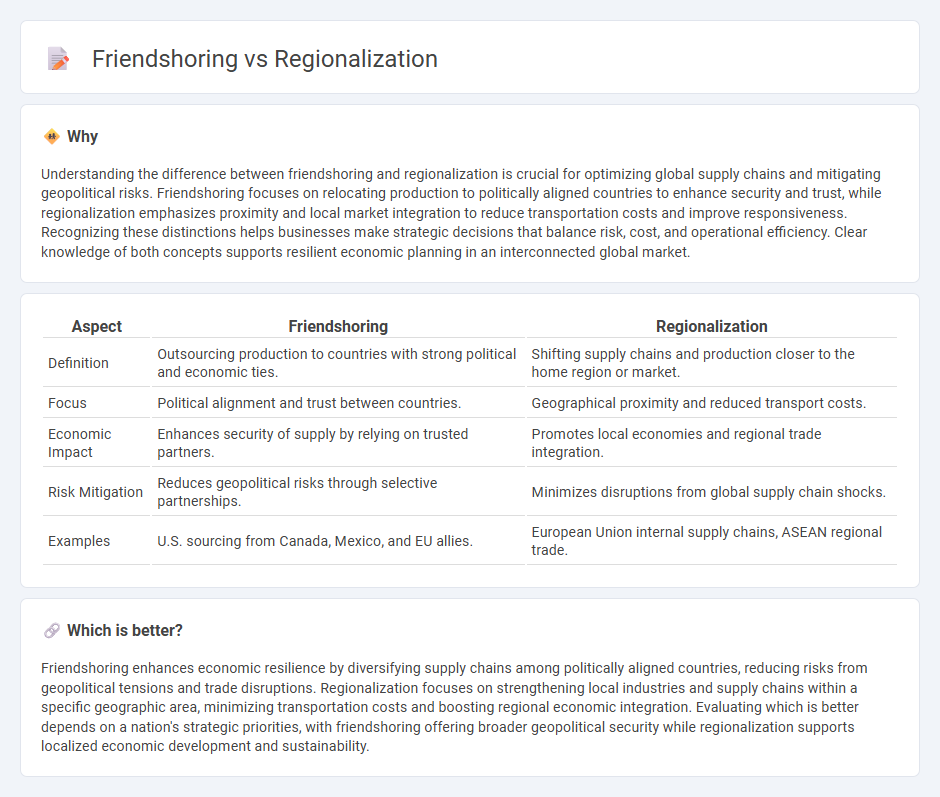
Friendshoring emphasizes relocating supply chains to allied nations to enhance economic security and reduce geopolitical risks. Regionalization focuses on concentrating production within nearby geographic areas to streamline logistics and boost local economies. Explore the advantages and challenges of these strategic economic shifts to understand their global impact.
Why it is important
Understanding the difference between friendshoring and regionalization is crucial for optimizing global supply chains and mitigating geopolitical risks. Friendshoring focuses on relocating production to politically aligned countries to enhance security and trust, while regionalization emphasizes proximity and local market integration to reduce transportation costs and improve responsiveness. Recognizing these distinctions helps businesses make strategic decisions that balance risk, cost, and operational efficiency. Clear knowledge of both concepts supports resilient economic planning in an interconnected global market.
Comparison Table
| Aspect | Friendshoring | Regionalization |
|---|---|---|
| Definition | Outsourcing production to countries with strong political and economic ties. | Shifting supply chains and production closer to the home region or market. |
| Focus | Political alignment and trust between countries. | Geographical proximity and reduced transport costs. |
| Economic Impact | Enhances security of supply by relying on trusted partners. | Promotes local economies and regional trade integration. |
| Risk Mitigation | Reduces geopolitical risks through selective partnerships. | Minimizes disruptions from global supply chain shocks. |
| Examples | U.S. sourcing from Canada, Mexico, and EU allies. | European Union internal supply chains, ASEAN regional trade. |
Which is better?
Friendshoring enhances economic resilience by diversifying supply chains among politically aligned countries, reducing risks from geopolitical tensions and trade disruptions. Regionalization focuses on strengthening local industries and supply chains within a specific geographic area, minimizing transportation costs and boosting regional economic integration. Evaluating which is better depends on a nation's strategic priorities, with friendshoring offering broader geopolitical security while regionalization supports localized economic development and sustainability.
Connection
Friendshoring and regionalization enhance economic resilience by shifting supply chains closer to politically aligned and geographically proximate nations, reducing dependency on distant or unstable regions. This strategic approach fosters stronger regional trade agreements and collaborative innovation hubs, boosting local employment and technological advancement. By prioritizing trusted partners and regional markets, economies mitigate risks associated with global disruptions while promoting sustainable growth.
Key Terms
Supply Chains
Regionalization in supply chains emphasizes sourcing and production within geographical proximity to reduce lead times, lower transportation costs, and enhance responsiveness to local market demands. Friendshoring prioritizes partnerships with politically and economically aligned countries to mitigate risks associated with geopolitical tensions, ensuring supply chain resilience and security. Explore deeper insights into optimizing supply chain strategies through regionalization and friendshoring for greater operational efficiency and risk management.
Trade Agreements
Regionalization emphasizes strengthening trade agreements within geographically proximate countries to enhance economic integration and reduce dependency on distant markets. Friendshoring prioritizes partnerships based on political alignment and trust, leveraging trade agreements with like-minded nations to secure supply chains against geopolitical risks. Explore the nuances of trade agreements shaping these strategies to understand their impact on global commerce.
Geopolitical Risk
Regionalization involves restructuring supply chains within specific geographic zones to minimize geopolitical risk by reducing dependency on distant or politically unstable regions. Friendshoring strategically shifts sourcing and manufacturing to politically allied countries to enhance security and maintain stable trade relations amid rising geopolitical tensions. Explore how businesses balance cost efficiency and risk management by adopting these strategies in today's volatile global landscape.
Source and External Links
Regionalisation - Wikipedia - Regionalisation is the tendency to form decentralized regions and can be observed in many fields such as geography, politics, agriculture, and linguistics, involving processes like dividing political entities into smaller jurisdictions or adopting regional language features.
Regionalization vs globalization: future direction of trade? - Recent trade data indicates there is no significant evidence supporting a shift towards regionalization in global trade, with stable shares of trade between neighboring countries and same-continent nations and an increase in average trade distance due to global economic integration.
Regionalization | New York State Education Department - The Regionalization Initiative promotes collaborative regional planning among local school districts to improve equitable educational opportunities by identifying and leveraging shared resources within larger regions.
 dowidth.com
dowidth.com